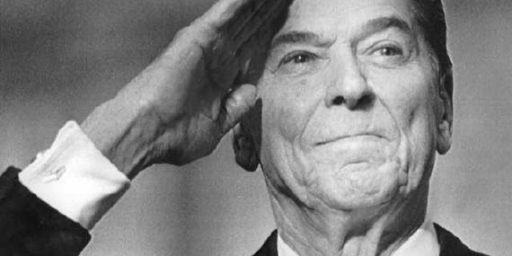“Real” Conservatism Redux
Jonah Goldberg has an insightful take on the intra-conservative debate spawned by the Harriet Meyers nomination:
What is remarkable about the Miers nomination is that the pro-Miers side managed to define the debate as one between elitists and “heartlanders” or some similar nonsense first.
[…]
I actually think this is a profoundly significant signal in the ongoing — and at times somewhat lamentable — transformation of the GOP into a populist party. For example, I’ve written many times about how liberals don’t understand that Fox News’ popularity has had less to do with conservatism and more to do with populism than they are prepared to see. Liberals think they’re the party of the people, so they tend not to understand populism when it comes from non-liberal quarters. But it is Fox’s anti-elitism which pulls in the ratings more than its conservatism. This has been hard to see in the past because Fox’s anti-elitism has generally been aimed at liberal institutions — the New York Times, the ACLU, Harvard, etc. But anti-elitism and conservatism are not and never have been the same thing. And I do think this will be more obvious in the months and years to come. I think this new “elites” versus “heartlanders” trend is only going to grow within the ranks of the GOP. I can’t say it’s all bad or all good. But it is a major sociological change if the arguments within conservatism are now going to be about “loyalty” to our people (trans: our Party) instead of loyalty to our ideas.
Quite right. Like Goldberg, I’m much more ideologically conservative and elitist than mainstream Republicans. I find Bill O’Reilly and Ann Coulter incredibly annoying; indeed, much more so than intellectual liberals like Michael Kinsley.
Like it or not, though, Goldberg and I are in a decided minority of the party. Almost by definition, when a catch-all party becomes the majority party, it becomes a hodgepodge of differently motivated groups that tend to have sharp disagreements. The Democrats found out the hard way in the 1970s and 1980s that catering too much to the base may be ideologically satisfying but is electoral suicide.
In Political Science 101, we talked about the tripartite division of political parties into the institutional, governmental, and electoral pieces (often referred to in the literature as “party-as-organization,” “party-in-government,” and “party-in-electorate,” respectively). The institutional party is the tiny elite that provides professional management of the party apparatus. They tend to be highly ideological and think about politics mostly at the abstract level. The governmental faction consists of current officeholders and those seeking office. They tend to be more practical and less ideological than their institutional counterparts. The vast majority of a party, though, consists of ordinary citizens who identify with and hopefully fund and vote for the party’s candidates. Only a few of them are particularly ideological, focusing mostly on general feelings about how the party in general and the candidates in particular will serve their interests.
George W. Bush is more of a true believer than any Republican president or presidential nominee since Ronald Reagan. But neither he nor Reagan are as conservative as the professional pundit class or party elites that back them. That’s very frustrating to the elites but very necessary when building a broad governing coalition.






In a system such as ours, having millions of people with conservative tendencies, but somewhat of an evolving understanding of that in which they believe, populism is a necessary tool to bring about the necessary change. While the elite or academic conservative is needed to corral the big picture, the populist approach tends to round up more horses.
I can barely tolerate O'(Pompous) Reilly, but see a real service being provided by Coulter. She, the masses can relate to. She’s not fearful of offending anyone with truth. The fact is that most stodgy old conservatives are too kind and unable to say it like it is. (which is why PC works so well as a weapon against conservatives)
The risk of populism is the possible slide to tribalism or … let’s face it, nationalism.
I am a lifelong conservative and Republican (I know, you know), but I’ve had some interesting discussions with other Republicans. They tell me they’d always vote Republican, no matter what. I’d ask, doesn’t that limit your power, your ability to influence events? They didn’t understand me. They didn’t quite get that when you are a guaranteed vote, you can be led anywhere.
Particularly at this time (with the possible Cheney Cabal, etc.) I think it is important to state the fundimentals – that truth and reason are the foundation of democracy.
The danger of populism/tribalism I think was proven in the last election, when basically truth was put on the back burner, and too many people voted tribal issues that are secondary.
I mean, name your hot button issue … no matter what it is, it is not safe without a functioning democracy … and that is what is at risk, not just by “crimes” but also by any vote (for 2008?) which is “already in the bag.”
Oh, please, Odo.
I understand your point, but it operates without the force of reality behind it. What is it you’re suggesting… that because Bush isn’t as conservative as I’d like, that I’d have been better served by putting the socialists like Kerry, and Gore, in power again?
It’s only real as far as there are absolutists out there. If you are “pretty sure” or “really likely” to choose Republican, that’s fine.
What I’m speaking to are those folks who are are so sure they’d be willing to mail off their absentee ballots now, without even knowing who was going to be nominated by either party.
… with respect to being forced to Kerry … that’s a real problem. Unfortunately the answer, a shake up in parties, or third parties strong enough to influence the big two … seems unlikely.
In case it isn’t clear, I think there are people who suffer this effect at both ends of the political spectrum. At both ends “party stalwarts” influence the behavior of the elected, but they also are left to guess how much influence they have. That’s because they are not addressed during much of the election cycle. Their votes are already counted. The election is pitched toward the “undecided” who are by definition more moderate.
… of course it is also a drag to be a moderate and discover how much was cheap talk ;-/
So it does, wherein lies the point. So, we need to work with what we have.
I’ve been thinking on this point for some days now as I’ve watching the bitching get louder about the Republcans, from the right.
I’m convinced that the changes will come, but slowly…. But that will happen only if the right is willing to see the journey through. And frankly, the attitudes I’m seeing right now are not encouraging.
I read your link. I’ve been thinking about pendulums also this week, though from the perspective of a “cheated moderate” Republican.
To be honest I abstained from the 2000 Presidential vote because I thought they both were knuckleheads. I did have a hope though, as Bush and Gore both pretended so hard to be moderates in the final weeks of the election, that if elected they would act like one. From my moderate perspective, I don’t think that happened.
I voted against Bush in 2004 for the “truth in democracy, especially as concerns war” issue.
It is actually kind of hard for me to deduce all of the Bush admin’s motivations, but the rough and tumble of their game goes beyond that.
I really don’t think you can have a functioning democracy with an institutional disrespect for truth and reason (and yes, science).
THe thing you’re missing here is one the far right missed, too.
Bush wasn’t pretending.
What I’m saying is that if you see him as left of you … and I see him as right of me … he must be somewhere in-between.
Unless he’s on some other scale. I guess there are people who suggest that too, that it is just pointless politicing, or corporate dealmaking, or ???